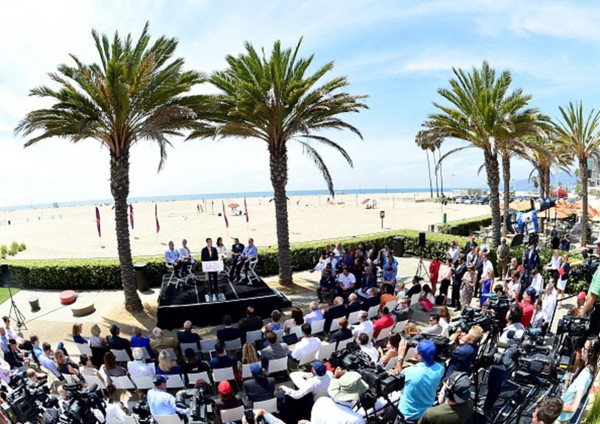Officials will remain tight-lipped about the fate of Rome’s 2024 Olympic and Paralympic Games bid until an October 11 press conference, that has reportedly been scheduled by the Italian Olympic Committee (CONI), is held in Italy’s capital.

However, information about the direction of the bid committee could be released sooner, perhaps as early as Friday when phase 2 bid documents are due into the International Olympic Committee (IOC) from Rome – and from rivals Budapest, Los Angeles and Paris. The IOC and the cities themselves typically issue press releases confirming the submission of the critical documents, and if Rome were to miss the deadline it would officially spell the end of its campaign.
Last month Rome’s Mayor Virginia Raggi pulled the required municipal support from the bid, fulfilling her election promise to focus spending on fundamental city projects instead of an Olympic Games. That endorsement was to be included in Friday’s submission, along with letters of support from other stakeholders. But unconfirmed rumors in the Italian press have been suggesting that Rome 2024 may submit the documents without the Mayor’s approval – a move that could buy time to allow the bid committee to further pressure the city council, or hope for a recall of the embattled Mayor who was elected in the summer on an anti-corruption platform.
This renewed hope has been fueled by a visit to the Eternal City by IOC President Thomas Bach who is in the capital to attend the Sport at the Service of Humanity conference at the Vatican. Bach reportedly met with with CONI President Giovanni Malago for several hours Tuesday to discuss the bid, among other issues.

But Bach said he has refused to get involved in the political issues.
He told Associated Press “this is a political discussion here in Italy and the IOC is politically neutral, so we will not interfere in internal Italian politics.”
“Quite frankly I do not think that this discussion has a lot to do with the Olympic Games.
“That’s the impression I get, that this is about internal Italian politics.”
Bach also said that he had not met with Raggi while visiting Rome.
By submitting the documents ahead of the deadline, Rome could extend its viability until at least December 6 when the IOC Executive Board (EB) meets in Lausanne and will review an evaluation commission dashboard. According to the new bid process being followed for the first time, the EB may choose at that time to defer any bid that they consider to be deficient. Presumably, lack of municipal support would fall into that category.
If Rome 2024 pushes forward, a delegation would be expected to present bid plans to the Association of National Olympic Committees (ANOC) General Assembly in Doha in November – though a critical opportunity, it is not technically required. Rome already abandoned a chance to host an important 30 minute press conference at the Rio Olympic Games in August.
The next (USD) $150,000 bid fee installment is not due to the IOC until January, 2017 – though further operational costs to get the campaign to that point would likely trivialize that amount.
On Sunday the @Roma2024 bid Twitter and Facebook feeds went ominously dark after days of frequent posts defending the values of the Olympic project. In today’s connected world where social media represents the heart and soul of a campaign, these missing vital signs likely indicate that Rome 2024 has indeed ended.
Follow @GamesBids for further updates.


